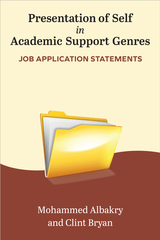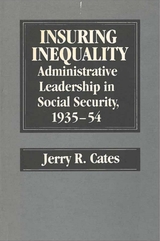2 books about Albakry, Mohammed

Presentation of Self in Academic Support Genres
Job Application Statements
Mohammed Albakry & Clint Bryan
University of Michigan Press, 2025
Applying for an academic job is a complex process that requires applicants to present their credentials, strengths, and values through multiple written documents. These self-promotional writing genres—particularly research, teaching, and diversity statements—carry different purposes and utilize distinct strategies to portray a job seeker as the right match for the hiring institution. Presentation of Self in Academic Support Genres demystifies these high-stakes genres by analyzing authentic texts and real-world examples. It provides insight into the intricacies and challenges of self-presentation in diverse settings and sheds light on an otherwise hidden discourse community and its conventions. It also includes dozens of engaging activities and tasks, some of which are specifically designed for multilingual writers, that guide readers through composing effective job application materials.
This theoretically grounded but practice-oriented book will be a valuable guide for recent graduates and newly minted PhD holders about to start their careers in higher education and beyond. Readers will gain awareness of job application expectations and best practices, and job seekers interested in pursuing careers beyond the classroom will also learn how to leverage their skills and qualifications for industry jobs. The book will be a great resource in advanced courses on genre-based writing instruction, English for Academic Purposes, and professional communication. In addition, it can be used in graduate professionalization courses, professional seminars, faculty development workshops, or by individuals working independently.
This theoretically grounded but practice-oriented book will be a valuable guide for recent graduates and newly minted PhD holders about to start their careers in higher education and beyond. Readers will gain awareness of job application expectations and best practices, and job seekers interested in pursuing careers beyond the classroom will also learn how to leverage their skills and qualifications for industry jobs. The book will be a great resource in advanced courses on genre-based writing instruction, English for Academic Purposes, and professional communication. In addition, it can be used in graduate professionalization courses, professional seminars, faculty development workshops, or by individuals working independently.
[more]

Writing Recommendation Letters
The Discourse of Evaluation in Academic Settings
Mohammed Albakry and Clint Bryan
University of Michigan Press, 2024
Even though reading and writing recommendation letters is one of the essential service tasks of the professorial life of academics, there are few resources to train graduate students and junior academics on how to draft a successful recommendation letter for different academic purposes. Writing Recommendation Letters draws linguistic and rhetorical principles from close to a thousand real-world examples of academic letters of recommendation. As a result, the research that informs the pedagogy is extensive, current, and highly relevant to the discourse of evaluation in academic settings with findings that have implications for genre-based writing instruction, English for Academic Purposes (EAP), and teaching of academic literacies. The authors are two experienced college professors who regularly teach graduate students and mentor young academics, so the reflection questions and instructor suggestions they provide were designed for today’s university classroom. The result is an instructive book that translates academic discourse structures and principles into accessible language, supplying authentic examples and ample writing practice.
Key Features
Key Features
- Readers will learn the theoretical context that defines the genre of letters of recommendation.
- The book highlights the similarities and differences between the three different types of letters of recommendation: letters written for graduate admission, letters written in support of fellowship applications, and letters written to support obtaining a faculty position.
- Chapters on different aspects of linguistic and rhetorical features discuss presenting the applicants' credentials, highlighting the strengths of their character, accentuating and downplaying certain traits, as well as the pros and cons of boilerplate language and the use of customary frames for opening and closing.
- Readers will see real-world examples of actual letters of recommendation to see how seasoned faculty build the case for the applicant.
[more]
READERS
Browse our collection.
PUBLISHERS
See BiblioVault's publisher services.
STUDENT SERVICES
Files for college accessibility offices.
UChicago Accessibility Resources
home | accessibility | search | about | contact us
BiblioVault ® 2001 - 2025
The University of Chicago Press









